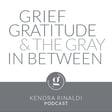
Reprocessing Trauma with Jennifer Schrappe, LPCC
Jennifer Schrappe LPCC-S has been a therapist for over twenty years, specializing in trauma. She is the Founder and Director of Chrysalis Enterprises, a private counseling practice in Columbus, Ohio. In addition to her work at Chrysalis, she is also a professional speaker. Jennifer has created the Heal Your Money Stuff, Calm Your Life program for those who struggle with ongoing money management issues, and is developing a program for entrepreneurs who are in recovery from food addiction.
www.jenniferschrappe.com
@jenniferschrappelpcc (Instagram)
Show Highlights:
This episode features Jennifer Schrappe, a licensed professional clinical counselor and supervisor specializing in trauma and emotional woundedness. The discussion centers on various healing modalities and how unresolved pain impacts daily life.
Trauma Expertise and Personal MotivationJennifer Schrappe utilizes IFS-informed (Internal Family Systems Informed) therapy as a trauma therapist. Her path was driven by a deep desire to help others avoid the pain she experienced, particularly relating to internalizing blame for her parents’ divorce and a resultant 40-year food addiction.
Healing Childhood Wounds (IFS)Schrappe guides clients to connect with the wounded child part (e.g., a 10-year-old) to unburden its pain and find safety and compassion. This process allows the client’s emotional protectors (like anxiety or the inner critic) to calm down, as they realize they are no longer reacting to pain from decades ago.
Neutralizing Recent Trauma (RRT)For recent traumatic incidents, she may use Rapid Resolution Therapy (RRT) to neutralize the traumatic effect and stop the brain from "looping" the memory (causing flashbacks or intrusive thoughts). RRT leverages neuroplasticity by having the client remain in a calm, safe place while the therapist retells the traumatic memory with purposefully incorrect details, forcing the brain to relearn the memory without the trauma and sting.
Life Impact and Self-ProtectionUnresolved trauma and anxiety can affect all aspects of life, including relationships, money management, and work. Jennifer views unhealthy or unproductive behaviors as self-protective responses. She also emphasizes that struggles like depression are not personal failings but signs that an internal part is "crying out for help".
Programs and Entrepreneur SupportHer work extends to webinars and programs, such as "Heal Your Money Stuff" and "Calm Your Life Program," addressing how internal parts interfere with daily functioning, specifically around money management patterns (e.g., fear spending, guilt spending). She is also developing support for entrepreneurs navigating addiction recovery or emotional struggles that crash with their business endeavors.
To sign up forthe podcst Newsletter go to https://www.griefgratitudeandthegrayinbetween.com/
Send me an email and let me know what you found impactful about this episode and if you have suggestion for other topics griefgratitudepodcast@gmail.com


